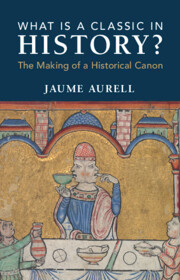Book contents
- What Is a Classic in History?
- What Is a Classic in History?
- Copyright page
- Contents
- Acknowledgements
- Introduction
- 1 The Conditions for Durability
- 2 The Dynamics of the Classic
- 3 The Inescapability of the Canon
- 4 The Canonical Function of Historical Genres
- 5 Genealogy as Double Agent
- Conclusions
- Selected Bibliography
- Index
5 - Genealogy as Double Agent
Published online by Cambridge University Press: 15 February 2024
- What Is a Classic in History?
- What Is a Classic in History?
- Copyright page
- Contents
- Acknowledgements
- Introduction
- 1 The Conditions for Durability
- 2 The Dynamics of the Classic
- 3 The Inescapability of the Canon
- 4 The Canonical Function of Historical Genres
- 5 Genealogy as Double Agent
- Conclusions
- Selected Bibliography
- Index
Summary
For much of history, from the dawn of Greek historiography to the postmodern 1970s, genealogy has been synonymous with continuity of origins and blood identity, and therefore closely connected with the concepts of the classic and the canon. Yet, during the last half century, specially thanks to the Nietzschean and Foucauldian philosophical deployment, it has shed its narrative garb to become an agent of discontinuity, and thus the nemesis of the classic and the canon. Many scholars have analyzed the modern development of genealogies after Nietzsche’s alleged foundational statement and its Foucauldian reception. But none of them has provided a systematic history of the trajectory of this concept, from antiquity to the present. This chapter attempts to fill this gap by providing a history of the concept of genealogy and its associated ideas, delving specifically into its historiographical uses, and connecting it to the four previous concepts discussed in the book. I will, specifically, emphasize its polysemy, try to locate what has remained and what has changed in this long trajectory, and explain the (only recently) radically opposed nature (nemesis) between the concepts of genealogy and canon – and the implications that this opposition brings to historiography.
Information
- Type
- Chapter
- Information
- What Is a Classic in History?The Making of a Historical Canon, pp. 258 - 299Publisher: Cambridge University PressPrint publication year: 2024
